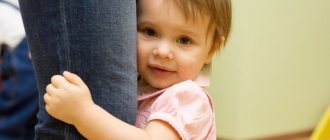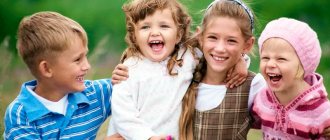Developmental and preventive program for the work of a teacher-psychologist with children in kindergarten
Personal readiness.
Includes the formation of a child’s readiness to accept a new social position - the position of a schoolchild who has a range of rights and responsibilities. This readiness is expressed in the child’s attitude towards school, educational activities, teachers, and himself. Personal readiness also includes a certain level of development of the motivational sphere. A child who is ready for school is one who is attracted to school not by its external aspects (the attributes of school life - a briefcase, textbooks, notebooks), but by the opportunity to acquire new knowledge, which involves the development of cognitive interests. The future schoolchild needs to voluntarily control his behavior and cognitive activity, which becomes possible with the formation of a hierarchical system of motives. Thus, the child must have developed learning motivation. Personal readiness also presupposes a certain level of development of the child’s emotional sphere. By the beginning of school, the child should have achieved relatively good emotional stability, against the background of which the development and course of educational activities is possible.
Intellectual readiness.
This component of readiness presupposes that the child has an outlook and a stock of specific knowledge. The child must have a holistic perception, elements of a theoretical attitude to the material being studied, generalized forms of thinking and basic logical operations, and semantic memorization. However, basically, the child’s thinking remains figurative, based on real actions with objects and their substitutes. Intellectual readiness also presupposes the development in a child of initial skills in the field of educational activity, in particular, the ability to identify an educational task and turn it into an independent goal of activity. To summarize, we can say that the development of intellectual readiness for learning at school involves:
differentiated perception;
analytical thinking (the ability to comprehend the main features and connections between phenomena, the ability to reproduce a pattern);
rational approach to reality (weakening the role of fantasy);
logical memorization;
interest in knowledge and the process of obtaining it through additional efforts;
mastery of spoken language by ear and the ability to understand and use symbols;
development of fine hand movements and hand-eye coordination.
Social and psychological readiness.
This component of readiness involves developing in children the qualities that enable them to interact with other children and teachers. A child comes to school, a class where children are engaged in a common task, and he needs to have fairly flexible ways of establishing relationships with other people, the ability to enter the children's society, act together with others, the ability to give in and defend himself. Thus, this component presupposes the development in children of the need to communicate with others, the ability to obey the interests and customs of the children's group.
What is a work program?
The work program is an important tool for the implementation of educational programs of preschool educational institutions, as well as an integral component in the work of a teacher, including an educational psychologist. This is stated in Art. 48 of Federal Law No. 273 of December 29, 2012 “On education in the Russian Federation.” It says:
“Teaching staff are obliged to carry out their activities at a high professional level, to ensure the full implementation of the taught educational subject, course, discipline (module) in accordance with the approved work program " (Article 48 of Federal Law No. 273)
Also, Federal Law No. 273 of December 29, 2012 “On Education in the Russian Federation” establishes the meaning of the work program in the education system, which is included in the concept of “educational program”, as an integral part of the complex of basic characteristics of education, as well as in the concept of “approximate basic educational program" as a structural unit of educational and methodological documentation. This is stated in Federal Law No. 273 in Art. 2 clause 9, clause 10.
Based on all of the above, you can determine what a work program is.
A work program is a normative document based on the educational program of a preschool institution, the content of which is adapted to the specific conditions of the group and reflects the age and individual characteristics of children’s development. (O.A. Voronkevich, T.Yu. Sedacheva, E.A. Yakimova) [1]
Thus, we can conclude that it is necessary to develop a work program by preschool teachers, including educational psychologists.
Leading needs of a preschooler
The psychology of preschool children often contains contradictions. For example, at this age they have two new needs:
- communication with other children;
- the need to be engaged in some activity important to society.
But the child cannot fulfill the second need in society. How can he resolve this contradiction? This is precisely what leads to the emergence of role-playing games, which enable preschoolers to play the roles of adults who are engaged in socially important activities.
An important need for a baby at this age is the need for acceptance and unconditional love. It is important for him to feel that he is special to his parents, and that he is loved simply for who he is. Parental acceptance and love creates a strong foundation for healthy self-esteem. Having matured, the child will not “curry favor” in order to earn love.
Unconditional love does not mean no punishment for wrongdoing. But parents need to separate personality and actions and punish the child precisely for his misdeeds, and not because he is “bad.” We need to explain to him that he is good and loved, but his parents must punish him for his misconduct.
Key features of preschool psychology
A characteristic feature of preschool age is the active development of attention, memory, speech, and thinking.
Throughout the preschool period, the child's involuntary attention predominates, which over time begins to turn into voluntary attention.
The child begins to consciously hold or direct certain objects.
REFERENCE. Voluntary concentration on something can last about 30 minutes.
Similar processes occur with memory. Until the age of 7, children develop voluntary visual and auditory memory. At the end of the preschool period, the child should already have visual-figurative thinking. Logical thinking begins to actively develop.
This helps the child learn to identify the characteristics of individual objects, learn to compare and generalize them. By the age of 6-7 years, most children already have dialogic speech and certain types of monologue.
IMPORTANT . The psychological development of personality is closely related to the child’s self-knowledge.
By the end of preschool age, the baby is already developing self-esteem.
It is based on the awareness of one’s successful activities, the encouragement of adults, as well as the assessment of one’s peers.
The child is already able to realize what place he occupies in the family and children's team.
Experts recommend playing educational games with your child. They should be aimed at developing logic and thinking.
During the game, the baby’s character is also formed. For a preschooler, the social-emotional side of activity is one of the most important. During the game, he learns to cooperate and follow established rules. It is important to teach your child to accept defeat correctly.
Around 7 years a crisis arises. Its main manifestation is the loss of spontaneity. The child begins to behave and act out.
How to help a child develop?
There is a concept called the “zone of proximal development.” It was introduced into psychology by the famous Soviet psychologist L.S. Vygotsky. The zone of actual development is the child’s skills that he performs independently, without the help of adults.
Also, in preschool age, a child actively develops many mental functions, and with the assistance of an adult, he can learn a lot. You just need to do it not FOR him, but TOGETHER with him. What a preschooler can do with the help of an adult, a little later he will be able to do on his own. This is called the zone of proximal development. If you want to teach your child something, do it with him first. In addition, this is how we develop his confidence in his abilities.
We are always in a hurry to get somewhere, and it seems easier and faster to do something for the child. But then we expect that he himself will be able to put away toys, cut out paper and put clothes in the closet.
Children are capital in which you need to invest time and attention, and they will pleasantly surprise you.
Speech development
At preschool age, the centers responsible for speech functions mature in the child’s psyche, and the process of mastering native speech is completed. The little man's vocabulary increases significantly. At six years old, a child’s active vocabulary contains 2500-3000 words. This is three times more than that of a three-year-old child.
However, these indicators depend entirely on the environment in which children grow up. Preschoolers have a large vocabulary if their parents talk to them a lot and read fairy tales and stories with them (this is how they become familiar with literary speech).
This period is characterized by the so-called word creation of children - the ability to form bizarre forms of words or use words in an unusual meaning.
Pochemochki, greedy and brawlers
Preschool age is the age of a thousand and one questions. The baby is actively exploring the world, and he is interested in knowing everything: what the sun is made of, and why the bag rustles. Although sometimes these questions are inappropriate, always take the time to answer them. This way you broaden your baby’s horizons and strengthen your relationship.
On the playground you can often see little “greedy” children who do not want to share toys with other children. Mothers who do not want conflicts urge their children to give the toy away to play with. But is this right? Preschool children are still characterized by selfishness, and it is important for them to “own” their toys. Besides, there is nothing wrong with a sense of ownership over your toys. Imagine if a person came up to you and asked you to play on your phone. You would refuse, and others would call you greedy.
This is how a child feels when asked to give his toy to another. It’s better to explain to your child that the toy belongs to him, and if he wants (I emphasize: if he wants), he can give it to someone else to play with, but that child will definitely return it. If the baby does not want to give, it is his right to dispose of his toy.
There are also children who strive to hit, push or call you names. Firmly, but without anger, stop the child. Usually at the age of 4 years, the child begins to test the boundaries of other people. In other words: “How can I interact with others?” And if unwanted behavior is not stopped, it will continue to appear.




